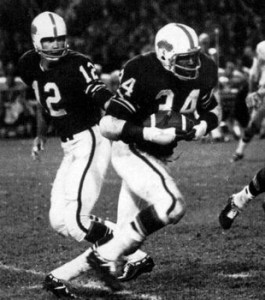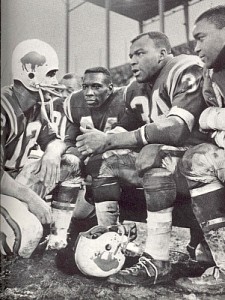Gilchrist was One Tough Cookie
Unless you are a long-time follower of the Buffalo Bills or a fan of the old AFL, you probably aren’t familiar with the name of Cookie Gilchrist. However, Gilchrist, who passed away earlier this week at the age of 75, was one of the early stars of the AFL and one of the few football greats never to play in college.
Though signing high school players was against NFL rules, Cleveland Browns Coach Paul Brown was given a special exemption by Commissioner Bert Bell to give Gilchrist a tryout following his senior year at Har-Brack High School in Pennsylvania.
Gilchrist left during training camp when he was not guaranteed a roster position. Had he ended up with the Browns, he might have eventually been paired with Jim Brown and perhaps formed one of the most devastating backfields in football history.
Instead, Gilchrist spent two years in the Ontario Rugby Football Union before moving to the Canadian Football League in 1956.
Gilchrist played for three different teams during six seasons in the CFL, but at each stop he was a standout and key performer. He was a five-time All-Star as a fullback and in 1958 rushed for 1,254 yards. He also played defense and was an All-Star linebacker in 1960.
During his CFL career, Gilchrist rushed for 4,911 yards, caught passes for 1,068 yards and intercepted 12 passes.
He joined the Buffalo Bills of the American Football League for the third season of the league in 1962 and the 6-foot-3, 250 pound fullback immediately became one of the top stars in the league.
Larger than most of the defensive players who were trying to tackle him, in 1962 Gilchrist became the first player in AFL history to rush for more than 1,000 yards as he gained 1,096 yards with 13 rushing touchdowns. He also kicked for the Bills that season and finished second in the league with 128 points.
Gilchrist earned first team All-Pro honors and was the AFL Player of the Year. In addition to being a great runner, he was also considered by many to be one of the best blocking fullbacks of all-time.
The following season he rushed for 979 yards and scored 14 touchdowns, but was often frustrated that he was not given the opportunity to play on defense. In a game against the New York Jets, Gilchrist gained a then-record 243 yards and scored five touchdowns.
In 1964 Gilchrist led the AFL in rushing for the second time with 981 yards and again earned All-Pro recognition.
The Bills finished the 1964 season with a 12-2 record and Gilchrist rushed for 122 yards as Buffalo defeated San Diego 20-7 to claim their first AFL Championship.
But Gilchrist had worn out his welcome in Buffalo after just three seasons and was sent to the Denver Broncos in the off-season.
His last productive professional season was in 1965 at the age of 30 when he finished second in the AFL with 954 rushing yards for the Broncos.
He played briefly for the expansion Miami Dolphins in 1966 and returned for a short stay with Denver in 1967, but never regained his previous dominating form. He finished his AFL career with 4,293 yards rushing and 37 rushing touchdowns.
One interesting story in which Gilchrist was involved exemplifies the times during which he played. It occurred following the 1964 season at the AFL All-Star Game. The game was to be played in a still-segregated New Orleans, but Gilchrist and the 20 other African-American players in the game refused to participate as a result of the racist treatment they received in the city, including being refused cab rides and being turned away at restaurants.
The game was eventually moved to Houston and many credit the actions of the AFL players for helping desegregate the city of New Orleans.
Because he played only four productive AFL seasons and CFL numbers are never given full weight when considering greatness, Gilchrist is often overlooked when the names of the best running backs of all-time are mentioned. However, he was the fullback on the AFL’s all-time team and without question one of the best players in AFL history.
Unfortunately, his cantankerousness didn’t mellow following his days in professional football. It is reported that he refused entry into the CFL Hall of Fame and originally refused induction into the Buffalo Bills Wall of Fame without a monetary appearance fee. Though he reportedly changed his mind regarding the Buffalo honor, he was not inducted before his death.


Dean, Thanks for doing this story. I suppose as a Buffalo correspondent I should have done it, but didn't have enough first hand knowledge of Cookie (I was in 4th grade when he helped the BIlls win the AFL) and didn't have time to do the research. Many people think that if the Superbowl had been initiated two years earlier Cookie and the BIlls would have beaten the Browns and Jim Brown. Too bad it wasn't. Looks like it will be many more years before our next opportunity comes around.
jwfcld